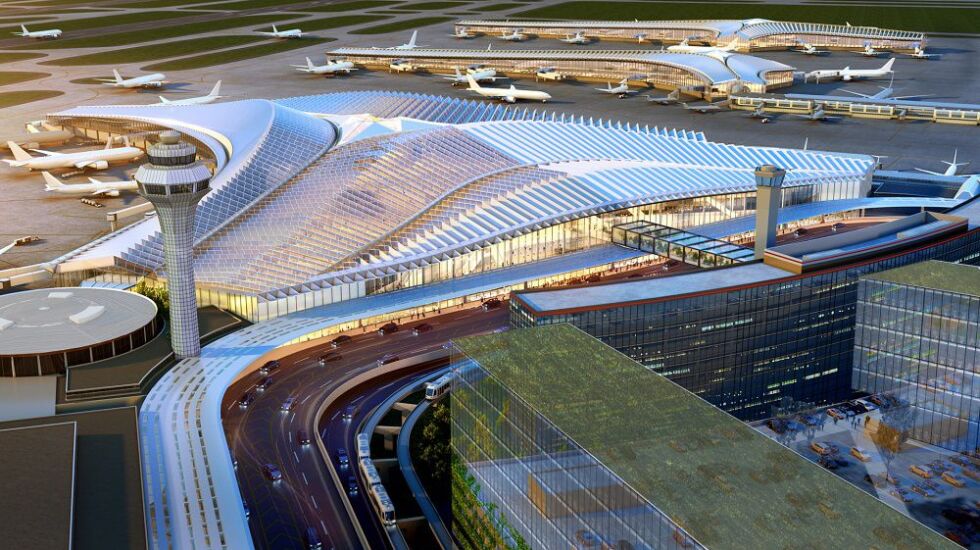
Last year about this time, the feds gave the official green light to the centerpiece of the massive O’Hare modernization and expansion plan: the $7.1 billion project to replace the airport’s 61-year-old Terminal 2 with a new global hub to handle both domestic and international flights.
The project, as this editorial board noted at the time, is a must when it comes to bringing O’Hare up to modern standards, befitting its standing as one of the world’s busiest airports.
Especially as air travel continues to bounce back post-pandemic, a fully modernized O’Hare — new runways and a new international Terminal 5 are already complete — has to remain high on Chicago’s agenda. The airport is an essential cog in Chicago’s economy, providing hundreds of thousands of jobs and billions in revenue. Modernizing it is key to O’Hare remaining competitive with other big-city airports, national and international.
It’s the type of massive capital project that can’t — and shouldn’t — be done by tinkering around the edges, as then-city Aviation Commissioner Ginger Evans made clear to us back in 2017. That sentiment still rings true today.
Yet United and American Airlines, the largest carriers at O’Hare, now reportedly want to scale back, slow down or — in a worst-case scenario that shouldn’t be part of the discussion — even indefinitely ground the project because of rising costs, the Sun-Times’ Fran Spielman reported last week. Negotiations on the matter between the airlines and City Hall are ongoing.
It’s a high-stakes test for Mayor Brandon Johnson’s administration. Holding the two powerful airlines to the deal they signed in 2018, under former Mayor Rahm Emanuel’s administration, will be a tough task for a new administration.
But City Hall cannot afford a misstep on this.
It’s a measure of how essential this project is that last Friday, U.S. Sens. Dick Durbin and Tammy Duckworth, who chairs a Senate subcommittee on aviation, issued a joint statement saying United and American “signed a contract which we expect them to honor” for the terminal project.
That echoes what Emanuel told Spielman: A deal’s a deal. The airlines got additional gates, modernized runways and other benefits, and they should now stick to their end of the agreement regarding the terminals.
“Across the globe and everywhere, people are modernizing their aviation systems and Chicago should be no different,” Emanuel said. “They signed onto it. It’s a contract.”
Do the math on costs
There’s no doubt that other big-city airports are surely hovering in the wings, salivating at any chance to take away business from O’Hare.
As Ald. Matt O’Shea, chairman of the City Council’s aviation committee, told Spielman. “Top airports throughout the country continue to come after us, looking to take passengers, looking to become stronger hubs. And we need to stay competitive.”
Jobs are at stake, too — construction jobs to finish the terminal project itself, as well as jobs at an expanded O’Hare and in surrounding businesses. That includes jobs and contracts with women and minority-owned businesses; as one point of reference, the Chicago Department of Aviation, which manages both airports, is expected to spend $177 million with women and minority businesses in 2023, 37% of its overall budget.
The airlines say they remain committed to modernizing O’Hare, which is in their best interests even as they try to cut a deal with City Hall. A state-of-the-art, easier-to-navigate “global hub” is in their best interests, too, as a big selling point to would-be travelers who would be able to catch connecting flights back home to Detroit or Omaha in the same terminal where they arrived back in the U.S. from France or Ghana or China.
From the airlines’ standpoint, the concern over rising costs is understandable. The entire O’Hare expansion had an initial price tag of $8.7 billion, but that’s now soared to $12.1 billion. The terminal project is supposedly $1.5 billion over budget.
Cost overruns are practically inevitable when it comes to construction. The first order of business should be to do the math and figure out some way to keep the price tag manageable.
But here’s the bottom line: O’Hare has gone longer than most other airports without a major rebuild. Now is not the time to step back, with new runways and other amenities already in place.
The new “global alliance” hub must be prepared for takeoff.
Send letters to letters@suntimes.com







